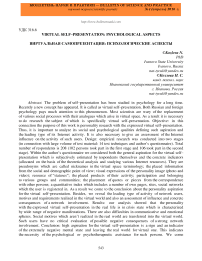Virtual self-presentation: psychological aspects
Автор: Kozlova Nataliya
Журнал: Бюллетень науки и практики @bulletennauki
Рубрика: Психологические науки
Статья в выпуске: 4 (5), 2016 года.
Бесплатный доступ
The problem of self-presentation has been studied in psychology for a long time. Recently a new concept has appeared. It is called as virtual self-presentation. Both Russian and foreign psychology pays much attention to this phenomenon. Most scientists are wary of the replacement of various social processes with their analogues which arise in virtual space. As a result it is necessary to do research the subject of which is specifically virtual self-presentation. Objective: in this connection the purpose of this work is personality research with the expressed virtual self-presentation. Thus, it is important to analyze its social and psychological qualities defining such aspiration and the leading type of its Internet activity. It is also necessary to give an assessment of the Internet influence on the activity of such users. Design: empirical research was conducted into two stages (in connection with large volume of test material: 14 test techniques and author's questionnaire). Total number of respondents is 208 (102 persons took part in the first stage and 106 took part in the second stage). Within the author's questionnaire we considered both the general aspiration for the virtual self-presentation which is subjectively estimated by respondents themselves and the concrete indicators (allocated on the basis of the theoretical analysis and studying various Internet resources). They are pseudonyms which are called nicknames in the virtual space terminology; the placed information from the social and demographic point of view; visual expressions of the personality image (photo and video); resource of “statuses”; the placed products of their activity; participation and belonging to various groups and communities; the placement of quotes or pieces from the correspondence with other persons; a quantitative index which includes a number of own pages, sites, social networks which the user is registered in. As a result we come to the conclusion about the personality aspiration for the virtual self-presentation. Besides, we reveal the leading type of activity of network users, motives and requirements realized in the virtual world and also an assessment of influence and concrete consequences of a network involvement. Results: our analysis showed that the personality with the expressed virtual self-presentation in the real life is in crisis state which is characterized by wide range of negative manifestations. There are also difficulties in communicative and emotional spheres. Social motives which aren't realized in the real world are transferred into the virtual world. Such users have no critical evaluation of possible negative consequences of a strong network involvement. Conclusion: high aspiration for the virtual self-presentation is a sign and an indicator of the extremely negative mental state and leaving the real world for virtual one. This indicates the necessity of the psychological or psychotherapeutic assistance for such persons. We come to the conclusion that it is necessary to limit children and teenagers from Internet access especially it concerns social networks.
Internet environment, virtual self-presentation, emotional sphere, communicative sphere, crisis state of the personality
Короткий адрес: https://sciup.org/14112330
IDR: 14112330 | УДК: 316.6 | DOI: 10.5281/zenodo.54787
Список литературы Virtual self-presentation: psychological aspects
- Андреев И. Л., Назарова Л. Н. Нейропсихические аспекты Интернета//Психология и Психотехника. 2014. №7. С. 701-715.
- Becker B. To be in touch or not? Some remarks on communication in virtual environments. 1997.
- Белинская Е. П., Жичкина А. Е. Современные исследования виртуальной коммуникации: проблемы, гипотезы результаты//Образование и информационная культура. Социологические аспекты. Труды по социологии образования. Т. V. Вып. VII./Под ред. В. С. Собкина. М.: Центр социологии образования РАО, 2000. С. 395-431.
- Чеботарева Н. Д. Интернет-форум как виртуальный аналог психодинамической группы//Архив электронного журнала «Суфий». Режим доступа: https://oldsufiwebzine.wordpress.com/2001/11/25 (дата обращения 08.07.2015).
- Доценко Е. Л. Психология манипуляции: феномены, механизмы и защита. Санкт-Петербург: Речь, 2004. С. 156-157.
- Фриндте В., Келер Т. Публичное конструирование «Я» в опосредованном компьютерном общении//Гуманитарные исследования в Интернете/Перевод с англ., под ред. А. Е. Войскунского. М.: Можайск-Терра. 2000. С. 40-54.
- Жичкина А. Социально-психологические аспекты общения в Интернете. М.: Дашков и Ко, 2004. 117 с.
- Козлова Н. С. Интернет как среда реализации социальных мотивов личности//Universum: Психология и образование. 2014. №11 (10).
- Козлова Н. С., Сушков И. Р. Стремление к публичности и самопрезентации как проявление специфических потребностей, реализуемых личностью в интернет-среде//Информационный гуманитарный портал «Знание. Понимание. Умение». 2013. №6 (ноябрь-декабрь). Режим доступа: http://www.zpu-journal.ru/e-zpu/2013/6/Kozlova_Sushkov_Publicity-Self-Presentation (дата обращения 7.07.2015).
- Крылов Е. Ю. Формирование тактик целенаправленной самопрезентации у студентов в виртуальной среде: автореф дис. … канд. психол. наук. СПб., 2012. 22 с.
- Майерс Д. Социальная психология. СПб.: Питер, 2007. 3-е изд. 794 с.
- Мышенкова А. Гендерные и возрастные аспекты использования Интернет//Флогистон. Режим доступа: www.flogiston.ru/projects/articles/int_gender.shtml (дата обращения 18.03.2016).
- Наумова Т. А. Социально-психологические особенности зависимых и независимых от Интернет пользователей//Научно-практическая конференция «Человек и мир: социальное поведение личности в изменяющемся мире» (15-17 января 2007 г.): материалы. Ижевск, 2007. С. 251-253.
- Плохих В. В., Акимов С. К. Особенности реализации когнитивных процессов у интернет-аддиктов//Психологический журнал. 2014. Т. 35. №3. С. 58-67
- Reid A., Deaux K. Relationship between social and personal identities: Segregation or integration//J. of Personality and Social Psychology. 1996. №71. Р. 1084-1091.
- Suler J. Online Photosharing Communities: Interpersonal dynamics in a photo-sharing community//CyberPsychology and Behavior. 2008. №11. С. 555-560.
- Сушков И. Р., Козлова Н. С. Стремление к публичности и самопрезентации личности в Интернет пространстве//Вестник КГУ им. Н. А. Некрасова. Серия «Психологические науки: Акмеология образования». Кострома, 2011. Т. 17. №4. С. 145-149.
- Сушков И. Р., Козлова Н. С. Реальность и виртуальность в сознании личности//European Social Science Journal. 2014. №4-2 (43). С. 256-263.
- Шевченко И. С. Факторы динамичности самопрезентаций в Интернет-общении//samagistro. Режим доступа: http://samagistro.blogspot.ru/2012/11/blog-post_974.html (дата обращения 24.05.2015).
- Voyskunskiy A. E. Internet Addiction in the Context of Positive Psychology//Psychology in Russia: State of the Art. 2010. Т. 3. С. 541-549.
- Войскунский А. Е. Перспективы становления психологии Интернета//Психологический журнал. 2013. Т. 34. №3. С. 110-118.
- Young K. S. Psychology of computer use: XL. Addictive use of the internet: a case that breaks the stereotype//Psychological Reports.1996. Т. 79. С. 899-902.


